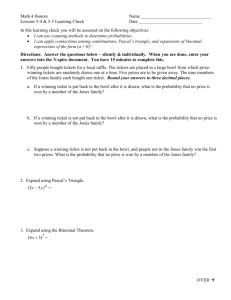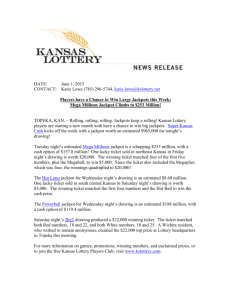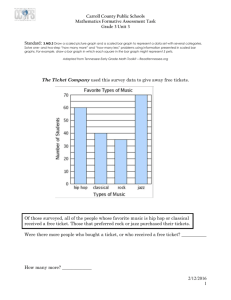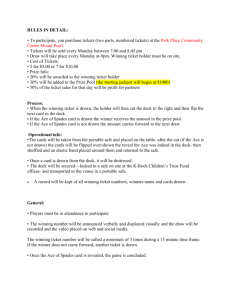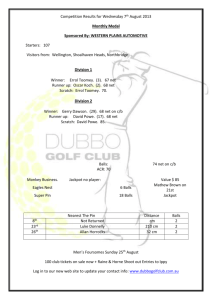California Super Lottery
advertisement
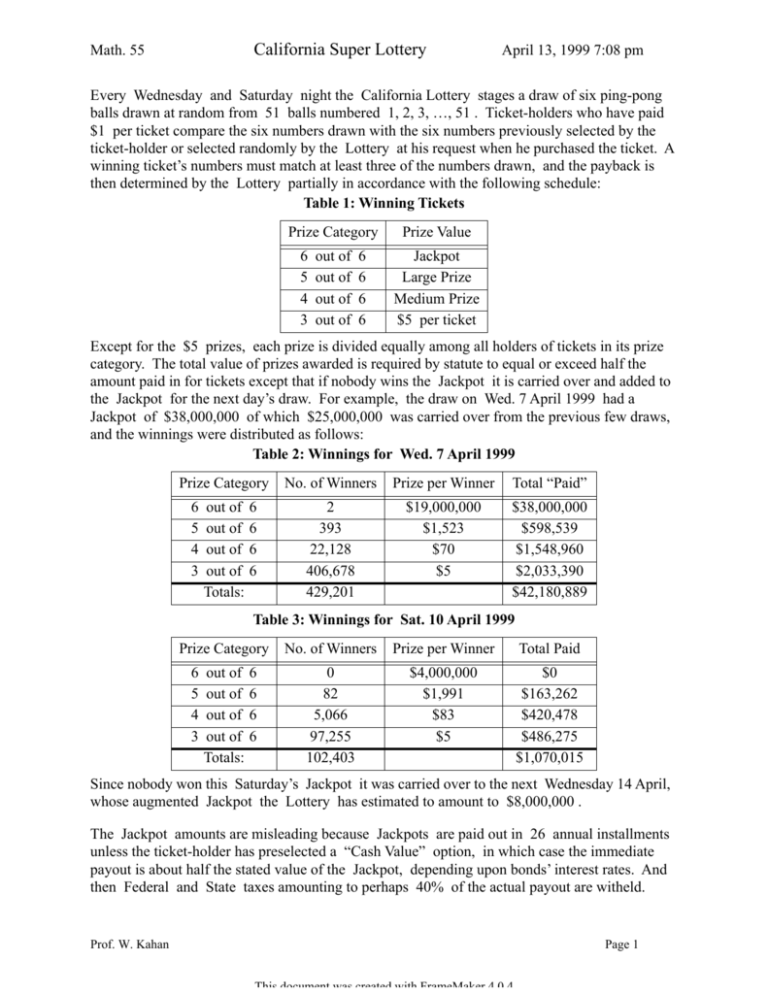
California Super Lottery Math. 55 April 13, 1999 7:08 pm Every Wednesday and Saturday night the California Lottery stages a draw of six ping-pong balls drawn at random from 51 balls numbered 1, 2, 3, …, 51 . Ticket-holders who have paid $1 per ticket compare the six numbers drawn with the six numbers previously selected by the ticket-holder or selected randomly by the Lottery at his request when he purchased the ticket. A winning ticket’s numbers must match at least three of the numbers drawn, and the payback is then determined by the Lottery partially in accordance with the following schedule: Table 1: Winning Tickets Prize Category 6 5 4 3 out of out of out of out of 6 6 6 6 Prize Value Jackpot Large Prize Medium Prize $5 per ticket Except for the $5 prizes, each prize is divided equally among all holders of tickets in its prize category. The total value of prizes awarded is required by statute to equal or exceed half the amount paid in for tickets except that if nobody wins the Jackpot it is carried over and added to the Jackpot for the next day’s draw. For example, the draw on Wed. 7 April 1999 had a Jackpot of $38,000,000 of which $25,000,000 was carried over from the previous few draws, and the winnings were distributed as follows: Table 2: Winnings for Wed. 7 April 1999 Prize Category 6 5 4 3 out of out of out of out of Totals: 6 6 6 6 No. of Winners Prize per Winner Total “Paid” 2 393 22,128 406,678 429,201 $19,000,000 $1,523 $70 $5 $38,000,000 $598,539 $1,548,960 $2,033,390 $42,180,889 Table 3: Winnings for Sat. 10 April 1999 Prize Category 6 5 4 3 out of out of out of out of Totals: 6 6 6 6 No. of Winners Prize per Winner Total Paid 0 82 5,066 97,255 102,403 $4,000,000 $1,991 $83 $5 $0 $163,262 $420,478 $486,275 $1,070,015 Since nobody won this Saturday’s Jackpot it was carried over to the next Wednesday 14 April, whose augmented Jackpot the Lottery has estimated to amount to $8,000,000 . The Jackpot amounts are misleading because Jackpots are paid out in 26 annual installments unless the ticket-holder has preselected a “Cash Value” option, in which case the immediate payout is about half the stated value of the Jackpot, depending upon bonds’ interest rates. And then Federal and State taxes amounting to perhaps 40% of the actual payout are witheld. Prof. W. Kahan Page 1 This document was created with FrameMaker 4 0 4 California Super Lottery Math. 55 April 13, 1999 7:08 pm How are the odds calculated for this kind of gambling? The number of ways to choose six balls is 51C6 = 18,009,460 . Each of these ways is as likely as any other provided we assume, first, that each ball is as likely to be chosen as any other, and second that the choices are independent, which means that after some balls have been chosen the next ball chosen is as likely to be any one of the remaining unchosen balls as any other of them. These assumptions are essential to the presumption that the lottery is “fair”. Only one of the ways of drawing six balls can match a ticket-holder’s choice, so the odds against that ticket winning a share of the Jackpot are 51C6 = 18,009,460 to one. For k = 0, 1, 2, 3, 4, 5 , in how many ways can the draw match just k of a ticket’s numbers? That number of ways turns out to be 6Ck·51–6C6–k because there are 6Ck subsets of k out of six numbers for k of the six drawn balls to match, and the other 6–k drawn balls must be drawn from 51–6 = 45 balls that match no other numbers on the ticket. Then the probability that the drawn balls will match just k of the ticket’s numbers is 6Ck·51–6C6–k/51C6 , and is tabulated below: Table 4: Probability of a Draw Matching a Ticket’s Numbers Match k out of 6 6C ·51–6C k 6–k Ways Probability = 1/Odds Prize Value k = 6 out of 6 1 5.55·10–8 ≈ 1/1.8·107 Jackpot k = 5 out of 6 270 1.5·10–5 ≈ 1/66702 Large Prize k = 4 out of 6 14,850 8.2·10–4 ≈ 1/1213 0.016 ≈ 1/63.5 Small Prize $5 per ticket 0.9834 ≈ 1 – 1/60.25 $0 k = 3 out of k = 2 out of k = 1 out of k = 0 out of Totals: 6 6 6 6 283,800 2,234,925 7,330,554 8,145,060 51C 6 = 18,009,460 1 A “Winning Ticket” is one among whose six numbers are at least three matched by drawn balls. In how many ways can the drawn balls do that? At first sight the number of ways may appear to be 6C3·51–3C3 = 345,920 since there are 6C3 subsets of 3 out of 6 , and the other three balls can be drawn from 51–3 remaining balls. But this kind of reasoning counts some of the ways more than once. The correct count is 298,921 obtained from either of 6C ·45C + 6C ·45C + 6C ·45C + 6C ·45C = 51C – 6C ·45C – 6C ·45C – 6C ·45C , 6 0 5 1 4 2 3 3 6 0 6 1 5 2 4 which makes the odds against having a winning ticket 18,009,460/298,921 ≈ 60.25 to one. How much can ticket-holders expect to win? Since about half the money collected from them goes back as prizes, we might think each $1 ticket worth about $0.50 on average. But at times the Jackpot accumulates so much from previous losers that it seems to offer a bargain, as on Wed. 7 April; then its $38,000,000 Jackpot might have made a $1 ticket with a 1/18,009,460 probability of winning the Jackpot seem to be worth at least $38,000,000/18,009,460 ≈ $2.11 . Alas, bargains are not always what they seem. Prof. W. Kahan Page 2 Math. 55 California Super Lottery April 13, 1999 7:08 pm First, the 26-year payout had an immediate cash value of about half the Jackpot’s announced value; second, it had to be shared among two Jackpot winners. This dropped the ticket’s expected share of the Jackpot to about $0.53 . Third, taxes took about 40% of each share, which further reduced the $2.11 to about $0.32 . Perhaps it is unfair to take taxes into account that way since winners ( but not losers ) can subtract from their winnings the cost of their other losing tickets purchased the same year; let’s ignore taxes because tax laws are too complicated. As we have seen, the expected value of a ticket depends upon how many other tickets will share the bigger prizes, and this depends upon how many tickets were purchased as well as the ways in which purchasers choose their numbers. Some purchasers choose their numbers in non-random ways using birthdates or street addresses; some purchasers distribute their choices more evenly than random numbers; some purchasers choose numbers that have been drawn more often than others and some purchasers choose numbers that have been drawn less often. The best we can do is to approximate these strategies by assuming that tickets are distributed as randomly as we think draws are distributed, every subset of six numbers being as likely as every other. And since the California Lottery publishes only how many tickets fell into each prize category, not how many won nothing, we shall have to estimate this number too. Taking account of the previous Saturday’s Jackpot of $25,000,000 , Wednesday’s needed about $13,000,000 from ticket sales to reach the announced value of $38,000,000 , but these numbers are inflated by a factor of about 2 over actual cash payouts, so the $13,000,000 really needed only about $6,500,000 cash to be paid from ticket sales. The other prize payouts of $598,539 , $1,548,960 and $2,033,390 are presumed to have been cash payments, so all the prizes paid from ticket sales totaled roughly $10,700,000 . Were this prize money half the amount realized from ticket sales, the number of tickets purchased would have been about 21,400,000 ; but this is not quite consistent with estimates obtained in other ways. The number of winning tickets, 429,201 , is expected to be about ( number of tickets purchased )/( odds against winning ) , and these odds are about 60.25 to one, so the number of tickets purchased must have been near (429,201)·(60.25) ≈ 25,860,000 by this reckoning. Similarly, 22,128 tickets matched 4 out of 6 despite odds of 1213 to one, so about (22,128)·(1213) ≈ 26,840,000 tickets were purchased by this reckoning. Now we have three estimates, all contaminated by random noise and dubious hypotheses concerning the randomness of ticket-holders’ choices. A plausible guess is that about 25,000,000 tickets were purchased. How many of 25,000,000 tickets might reasonably be “Expected” to win the Jackpot? This “Expectation” is 25,000,000/( Odds against the Jackpot ) ≈ 25/18 ≈ 1.39 , which is not an integer. Perhaps a better idea of what to expect is obtained from the estimated probabilities of finding k Jackpot winners among 25,000,000 tickets on the assumption that each ticket has independently a probability p := 1/18,009,460 of winning the Jackpot. From the textbook’s theory of Bernoulli trials we find those probabilities to be as follows for k = 0, 1, 2, ... : Table 5: Probability of k Jackpot Winners in 25,000,000 tickets Prof. W. Kahan k 25000000C ·pk·(1–p)25000000–k k 0 1 2 3 0.25 0.35 0.24 0.11 Page 3
